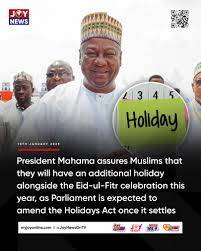Eid-ul-Fitr: Mahama Calls for Compassion and Relief to the Vulnerable
While Muslims worldwide and Ghanacelebrate Eid-ul-Fitr, former President John Dramani Mahama has challengedcitizens to utilize the event as an opportunity to showcase compassion and kindness to needy people in society. Addressing a celebrationevent organized by the National Chief Imam at Black Star Square in Accra, Mahama expressed that Eid is not just a day for party and celebrations butalso an age of self-assessment and humanitarianism.
The Significance of Eid-ul-Fitr
Eid-ul-Fitr is the festival at the end of the Islamic holy month of Ramadan, a time of fasting, prayer, and spiritual renewal. Although it is a day of thanksgiving and celebration, it also has a strong component of charity and social welfare. Muslims are urged to give Zakat al-Fitr, a charity intended to help those who are less fortunate, sothat all individuals would be able to partake in the celebration.
Mahama reiterated this call, appealingto Ghanaians of all religious denominations to be compassionatetowards those poor, ailing, and going through other forms of hardship. "As we mark the Eid-al-Fitr celebration, let us not lose sight of those vulnerable among us. This is a time for introspection, compassion, and empathy," he appealed.
A Call to Social Responsibility
The former president stressed that religious holidays should not be whenacts of charity are granted but that this should become part of everydaynorms of society. He called on citizens, companies, and churches as well to make corporate social responsibility apriority in terms of funding projects reducing poverty and sendingeducation, medical help, and jobs toneedy people.
We have to watch out for thevulnerable and lend them a helping hand," Mahama said, explaining that leadership is judged by how well oneis able to help others. He also calledon religious and community leaders to set the example by promoting a culture of giving and social responsibility.
Challenges Facing Vulnerable Groups
Mahama acknowledged the fact that the majority of Ghanaians continue to face economic challenges, especially in light of world issues such as inflation, unemployment, and the rising cost of living. He asserted that policymakersneed to embrace programs thatprovide lasting support to poorcommunities and appealed for long-term solutions to these issues.
Beyond government intervention, he stressed the role of individual and collective efforts in making a difference. “The true essence of this celebration lies in our ability to uplift one another. Let us use this occasion to strengthen the bonds of brotherhood and ensure that no one is left behind,†he added.
The Role of Religious and Community Leaders
Religious groups have always been atthe forefront of providing aid to the poor, and Mahama encouraged them to continue doing so. He called on mosques, churches, and community organizations to organize food drives, fund educational programs, and provide healthcare services to thepoor.
He also urged business leaders and philanthropists to volunteer and contribute to shaping a more caringsociety where the poor do not have to struggle. By incorporating social responsibility into their business, corporations can create lasting change and improve the lives of many.
A Message of Unity and Compassion
Eid-ul-Fitr is a time of unity, wherepeople of different backgrounds come together to celebrate. Mahama appealed for replication of this cultureof unity, particularly in times of hardship. He reminded the Ghanaians of how acts of kindness, no matter how small, can significantly improve a person's life.
"We always have to keep in mind that true happiness isn't found in rejoicingat our own triumph, but rather in sharing our blessings with others," he said.
Looking Beyond Eid
Although Eid is a wonderful platform to highlight the importance of charity, Mahama urged citizens to extend the culture of giving outside the festivities. He emphasized that the developmentof the country is dependent on the people's contribution as a group, whereby they work together so that no one is left behind.
He concluded his speech by calling on Ghanaians to stop for a moment and reflect on their position in society and what tangible action they could take to help those who are less fortunate. Through donation, volunteering, or simply advocating for social change, every individual has a stake in building a more compassionate and just society.
Conclusion
Mahama's message is a powerful reminder of values encapsulated in Eid-ul-Fitr—generosity, kindness, and togetherness. While most people arefacing challenges, his call to action leads Ghanaians to look beyond themselves and touch the lives of others.
In embracing such values, both on Eid and in life at large, society can construct a future where the vulnerable are cared for, and no one is left behind.
EID-UL-FITR: LET€™S LOOK OUT FOR THE VULNERABLE IN SOCIETY €“ MAHAMA URGES
March 31, 2025
9 months ago


